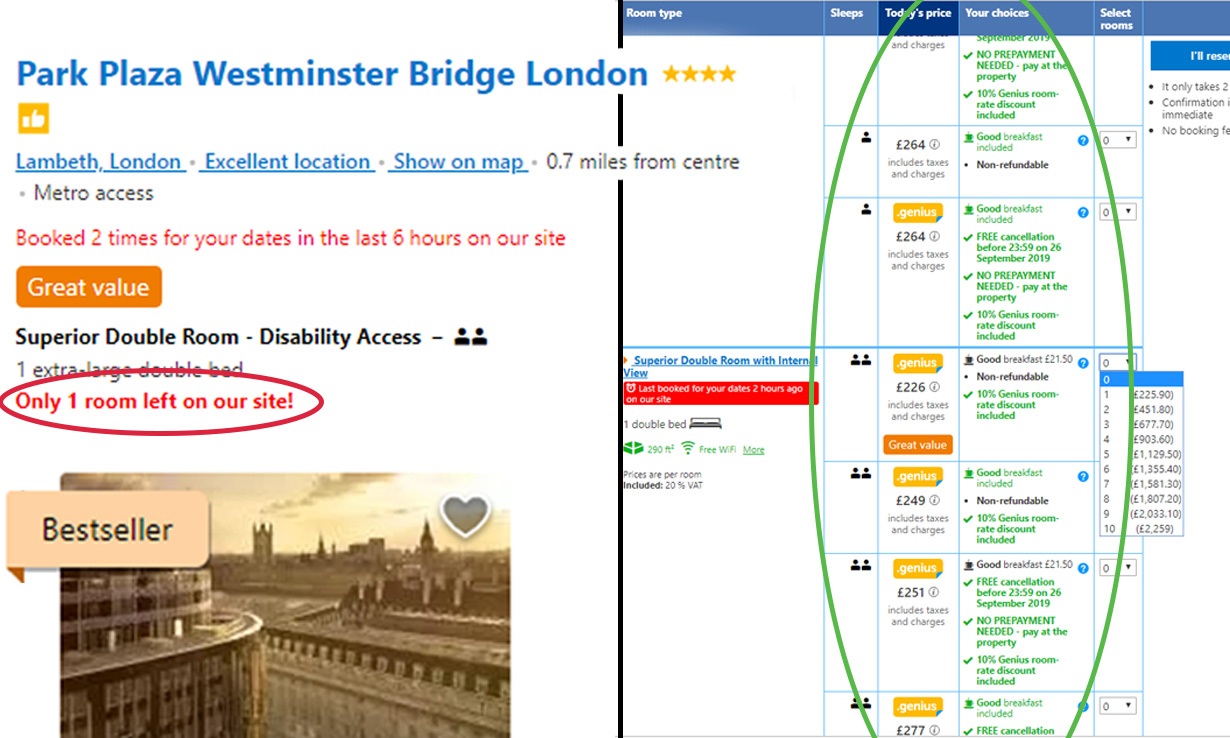By clicking a retailer link you consent to third-party cookies that track your onward journey. This enables W? to receive an affiliate commission if you make a purchase, which supports our mission to be the UK's consumer champion.
Booking.com still misleading holidaymakers with '1 room left' claims

Booking.com is still giving a false impression of hotel availability to rush consumers into making a booking, Which? Travel has found.
Our snapshot research repeatedly found that 'only 1 room left on our site' prompts didn't ring true when clicking through to the booking page.
In one case, the site was offering another 34 rooms at the same London hotel - 10 of which were almost identical and cheaper in price than the 'last room' listed.
This is despite the 1 September deadline having passed for sites to make changes following enforcement action from the Competition and Marketing Authority (CMA).
Enforcement action

Following pressure from Which? Travel, Expedia, Booking.com, Agoda, Hotels.com, ebookers and Trivago were investigated over concerns around pressure selling, misleading discount claims, the effect of commissions on search results and hidden charges.
The CMA concluded that practices such as giving a false impression of a room's popularity, or not displaying the full cost up front, could potentially break consumer protection law.
The six sites in question were given until 1 September 2019 to make changes, but our snapshot research shows that while Booking.com has made some changes to its site it hasn't gone far enough.
Want to know which platforms to trust? See the full results of our best and worst hotel booking sites survey.
Misleading scarcity claims

During our spot checks of all six sites, we found that five out of 10 of Booking.com's 'only X room left on our site' claims failed to give an accurate picture of availability.
For example, the search results for Park Plaza Westminster Bridge warned that just one room was available - a superior double room (with disability access) - priced at £232. A 'secret deal', Booking.com claimed.
However, after clicking through to the booking page, we scrolled down to find another 10 superior doubles (with internal view) available for a cheaper rate of £226.
In total, 34 empty rooms were still up for grabs on Booking.com for the same hotel on the same night.
Not only could this unnecessarily rush customers into making a booking decision, it was pushing them towards a rate that was £6 more expensive.
Other sites have qualified their prompts following the CMA probe. Agoda, for example, now tells customers: 'We only have 1 left at this price'.
Booking.com responds

A spokesperson for Booking.com told us that it had worked hard to implement the commitments agreed with the CMA, which include finding ways to inform customers about the data supporting messages on the availability and popularity of specific properties.
It also said it maintains ongoing collaboration to further enhance the consumer experience.
CMA CEO Andrea Coscelli said: 'The CMA will now be watching to make sure that these major brands, used by millions of people in the UK every year, stay true to their word.
'We will take action if we find evidence that firms are breaking consumer law.'
TripAdvisor, Airbnb and Google promise to comply

According to the CMA, 25 companies, including big brands like TripAdvisor, Airbnb and Google, have now agreed to change how they display information to comply with consumer protection law.
Large hotel chains Accor, IHG, Hilton, Marriott, Radisson Hotel Group and Wyndham Hotels & Resorts have requested more time so that the full cost of a hotel room - including taxes and resort fees - are always displayed up front.
It means people still need to be wary of hidden fees to ensure they get the cheapest deal when booking accommodation online.


